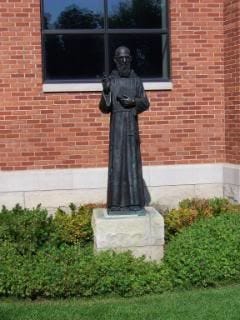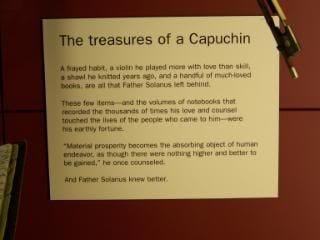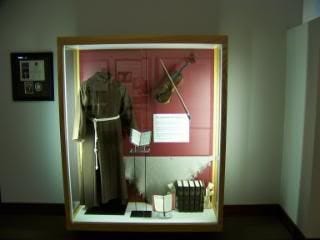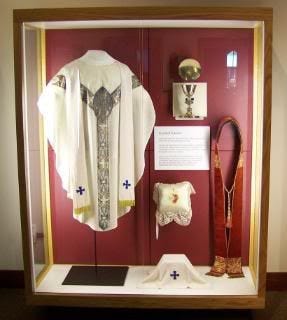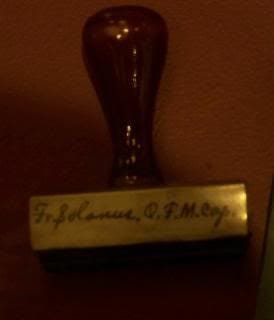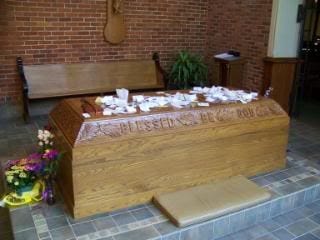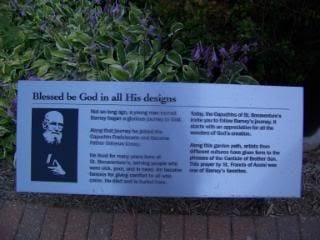Thursday, July 31, 2025
U.S. bishops invite Catholics to pray for end to taxpayer-funded abortion
Wednesday, July 30, 2025
Remembering a Visit to the Solanus Casey Center
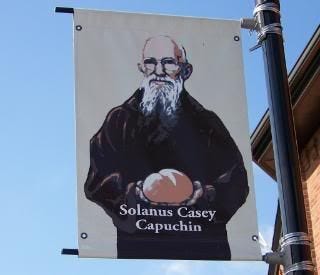
I planned to visit the friary and the center if I could get any free time. I was able to visit after the conference officially ended, and I stopped there for a short visit before leaving Detroit to drive home to Western New York.
The exhibit also included the vestment he wore for his last Mass, and his Chalice and Paten
...and the rubber stamp he used to sign the many letters he sent to people in response to their letters asking for his prayers and guidance. (He received so many letters that, as he got older and struggled with health, he would dictate letters to secretaries, then stamp them with his signature.)His tomb had been moved into the church once the process had begun to investigate his sanctity - a first step toward him possibly being declared a saint.The tomb of the long-time porter is located, appropriately, at one of the entrances to the church. There is a carving of a violin on it.
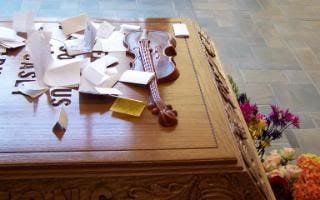
It was also covered with slips of papers on which there were prayer requests. I wrote my own request, asking him to pray for something that is troubling my heart.
At the entrance to the Center, there is a garden with art reflecting lines from St. Francis of Assisi's "Canticle of Brother Sun."
I also got a lesson in Franciscan poverty. I'm a bibliophile (with a house jammed with far too many books). After my initial swing through the center and the chapel, I went to the bookstore/gift shop, hoping to find a book or two that I did not already have (or three or four!).
It closed at 4 - before I got to it. Ha!
In the years since that visit, Father Solanus has been beatified, and there is a miracle being currently investigated that could lead to his being officially declared a saint, though, in my mind he already is. I made my Secular Franciscan Profession in 2011, and took him as my patron saint.
Meanwhile, the center has undergone a major renovation since my visit. I believe the tomb has been moved.
I hope to get back there again some day.
Tuesday, July 29, 2025
Ozzy Was a Whiz Kid
was by water borne
to the Alamo
where he was heard to mumble, "When ya gotta go, ya gotta go."
(According to the San Antonio Express News, on Feb. 19, 1982, an intoxicated Osbourne publicly urinated in Alamo Plaza, specifically on the Alamo Cenotaph, a 60-foot monument commemorating the men and women who chose to defend the Alamo in 1836.
He was arrested and paid a fine, and was banned from performing in San Antonio for 10 years. He apologized, and was eventually allowed to perform in that city again.
Then, in 2015, 33 years after the incident, he was finally welcomed back to the Alamo for a segment of the History Channel's series, Ozzy & Jack’s World Detour.
After his death July 22, the Alamo, on its Instagram account, issued a statement:
However, redemption and reconciliation eventually became part of his history as well. In 1992, Ozzy personally apologized to then-Mayor Nelson Wolff and expressed genuine remorse for his actions. Decades later, in 2015, he revisited the Alamo grounds to learn and appreciate the site's profound history, openly demonstrating humility and understanding.
At the Alamo, we honor history in all its complexities. Today, we acknowledge Ozzy Osbourne's journey from regret to reconciliation at the historic site, and we extend our condolences to his family, friends, and fans around the world. May he rest in peace.)
Pax et bonum
Tuesday, July 22, 2025
The Real War On Women
Sunday, July 20, 2025
Carter Clerihew
Good Jimmy Carter,
when it comes to presidents was one of the smarter.
Historians rank his presidency pretty low,
but it’s looking better these days thanks to “Scranton Joe.”
Thursday, July 17, 2025
Sacramental Dates
The late Pope Francis once said that we should celebrate our Baptismal dates.
"It is like a birthday because baptism makes us reborn in Christian life," he said to parents. "That is why I advise you to teach your children the date of their baptism as a new birthday: that every year they will remember and thank God for this grace of becoming a Christian.“
I decided to dig out my Baptismal record, and the dates of my other Sacraments.
I was Baptized on July 17, 1955, at St. Margaret Church in Brockton, Massachusetts.
It’s fitting it was at St. Margaret Church. My mother was a Scottish immigrant, and St. Margaret was not only a Queen of Scotland, but is also the patron saint of Scotland.
I was also please with the date when I realized it’s the feast of Saint Charbel Makhlouf, a Lebanese Maronite Catholic monk.
I had first become aware of Saint Charbel at the Fatima Shrine in Lewiston, N.Y. They have a statue of him there, and I was impressed by his beard!
And a couple of years ago, some local Lebanese Catholics donated a statue of him and some prayers to him to the Saint Padre Pio Chapel where I volunteer and where my Secular Franciscan Fraternity meets. I took information about a Novena to Saint Charbel, and I have been saying it every day since as part of my night prayers.
My baptismal names are “Lee” and “Francis.”
Lee comes from my father’s middle name, and is the name by which he was known; only his mother and siblings called him by his first name.
Francis comes from my great grandfather on my mother’s side. He lived in Scotland, and I only met him briefly when I was a child and my mother brought my brother and I to Scotland for a visit that lasted a couple of months. I cried when I first met him because he had a beard! Beards were not common in the U.S. in the 1950’s.
My First Communion took place May 27th, 1962, at Sacred Heart Church in Brockton, Massachusetts.
We attended that parish, and I went to the parish school for first and part of second grade. That I got into the school my mother considered a miracle. When she went to enroll me she was told the first grade classes were all full and there was no room for me. She left the school and walked across the parking lot to the church. She went in and prayed for a while. When she came out, the principal, a nun, called her over. Apparently she had been watching mom and saw her go into the church. The principal told her that they would make room for me.
I remained at the school long enough to be part of the First Penance and Communion classed. Alas, I don’t know the date of my First Penance. Then, part way through second grade, we moved because my father got a job in Western New York.
My Confirmation date was October 13, 1965, at St. Stephen's Church in Geneva, N.Y. When I looked it up that date it jumped out at me immediately.
On October 13, 1917, thousands of people witnessed the Miracle of the Sun at Fatima.
The Apparition of Our Lady at Fatima has been declared worthy of belief by the Church. On the anniversary of that Marian day I chose as my Confirmation name Joseph. How appropriate.
I admit I chose that name for non-religious reasons. Joseph was my brother’s middle name, and that’s why I chose it. I have since come to appreciate who St. Joseph is, and to ask for his guidance as I raised my own children.
I married the good-looking one on August 22, 1992, at Corpus Christi Church in Rochester, New York. I had met her two years earlier at an abortion protest.
In 1990, she was part of a Catholic group staging a sit-in at a site where abortions were taking place. I was a reporter, covering the protest - I was pro-life, but as a reporter had to remain objective when covering it. I tried to interview one of the leaders of the protest, a woman I knew from church, but she suggested I talk to the woman who would become my wife. My future wife deferred, but the following Saturday, I spotted her at church; turns out we attended the same church and always went to the same Mass. We chatted after the Mass, then in subsequent weeks began sitting together, and, well, married two years later.
Since I was never ordained, I did not receive those sacraments. The closest I came it when I professed as a Secular Franciscan July 9, 2011.
I have not yet received Anointing of the Sick - which used to be called Extreme Unction or the Last Rites.
I hope it will be a while before I enjoy that Sacrament!
Thank you for the suggestion Pope Francis. May you rest in peace.